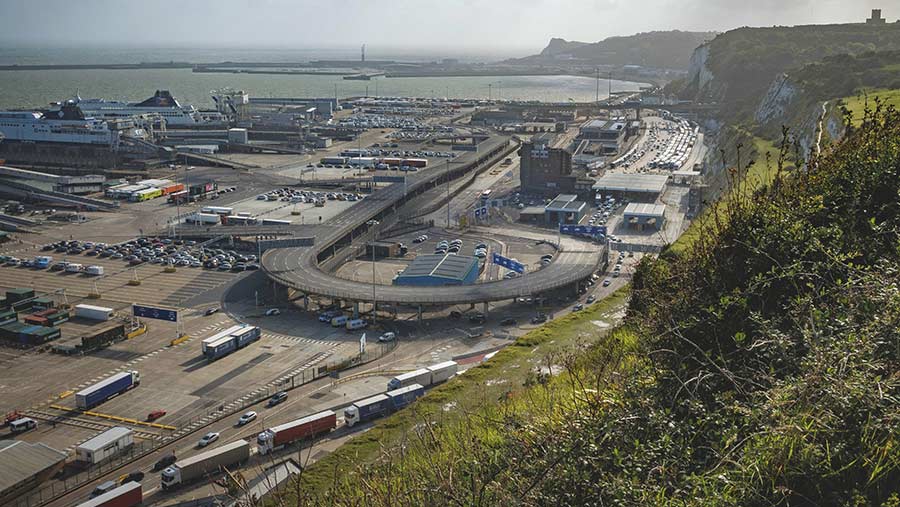Farm groups frustrated by delay to EU food import checks
 © Mathieu/Adobe Stock
© Mathieu/Adobe Stock Farm organisations have criticised the government’s decision to delay post-Brexit checks on EU imports for a further six months.
While the EU imposed stringent checks on British exports from 1 January 2021, the UK fast-tracked imports to avoid food shortages.
The government planned to introduce documentary checks on animal products for human consumption from 1 April 2021. It aimed to match Brussels by imposing third-country status on EU goods by 1 July 2021.
However, Cabinet Office minister Michael Gove has announced Britain is not yet ready to introduce the checks due to disruption caused by the coronavirus pandemic.
Instead, Mr Gove has announced a revised timetable for the works to be completed and checks to start:
- 1 October 2021 Pre-notification and export health certification for animal products required
- 1 January 2022 Pre-notification and export health certification required for low-risk plants and plant products
- 1 January 2022 Physical checks at the border begin on a range of agri-food products and high-risk plants
- March 2022 Physical checks begin on live animals and low-risk plants and plant material.
Food shortages fears
Labour’s shadow Cabinet Office minister, Jack Dromey, said the chopping and changing of rules smacked of ill-preparedness and incompetence. “They have had years to prepare for this, but can’t stop missing their own deadlines.”
Mr Dromey was referring in part to border control posts. Thirty of these were supposed to be operational by 1 January 2021, but this slipped to 1 July and has now moved to
1 January 2022.
See also: SFI pilot: Farmers ‘will be paid for simply meeting the law’
The aim was to ramp up inspections and checks on imports from the EU, a system that farmers have been hoping would stem the influx of cheap food and create a more even trade system.
But it was revealed earlier this week that with just 16 weeks left before their planned introduction, construction had not even begun at some sites which remained bare, waterlogged fields.
The British Retail Consortium said some border posts were little more than a hole in the ground. It welcomed the delay because it feared increased checks would cause food shortages.
The organisation’s head of food, Andrew Opie, said UK shoppers might have seen empty shelves for some products.
It would have been foolhardy if the government had insisted checks were put in place before IT systems, staff and infrastructure were ready, he said. However, UK farm groups have voiced frustration.
NFU president Minette Batters said the UK’s agri-food sector had been struggling with the additional costs and burdens that moving goods to the EU now entailed. “It is frustrating that our government is not taking a similar approach to the treatment of imports coming into Great Britain from the EU,” she said.
“Our exporters face additional costs and run the risk of financial losses if products are turned back or held up at the border.
Yet today’s announcement means that EU producers will maintain access to the UK market relatively burden-free for a considerable amount of time. It is crucial that we achieve a level playing field with pragmatic checks on imports and exports as quickly as possible.”
National Pig Association senior policy adviser Charlie Dewhirst said: “Given the disruption to pork exports resulting from additional checks required by the EU since the start of this year, this clearly disadvantages British pig producers.
“We are not being allowed to compete on a level playing field with EU producers, who are gaining a clear competitive advantage.”
Not fit for purpose
Mike Gooding, director of the Farmers First marketing group, called for an urgent revision of the post-Brexit export system.
“We are back to hard copy documents that have to be signed off before the lorry leaves the abattoir and accompanies the consignment through its journey across Europe. It used to take us 24 hours to get a load from Warwickshire to Paris. It now takes 48 hours,” Mr Gooding said during an AHDB webinar on food exports.
“Every day of lost shelf-life for the product is a day that allows competitors into the marketplace. I would say to anyone with aspirations of making the UK a global trading giant, we have to get better systems in place.”
However, Irish farmers have welcomed the continuing open-door policy, which they said staved off a substantial ramping up of the regulatory burden on their food exports.
Irish Farmers Association president Tim Cullinan said the six-month extension gave agri-food exporters a major breathing space.
Post-Brexit trade deficit
The Office for National Statistics has released figures showing the extent of Brexit’s effect on GB exports.
The January 2021 fall in trade was the largest monthly drop since records began in 1997. Overall UK exports to the EU fell by £5.6bn (40.7%) year on year.
Within the total, food exports were down £0.7bn or 63.6%. However, difficulties with new rules also took their toll on imports. Total imports from the EU and third countries dropped by £8.9bn (21.6%) in January 2021 compared with January 2020.
